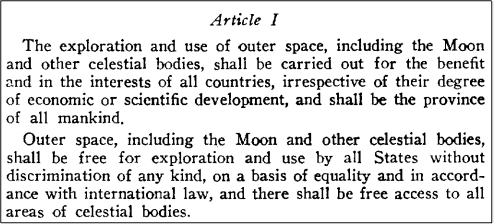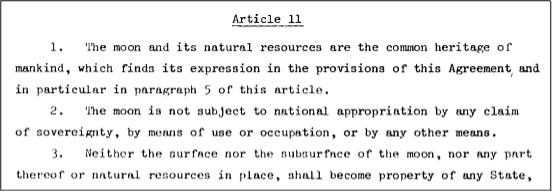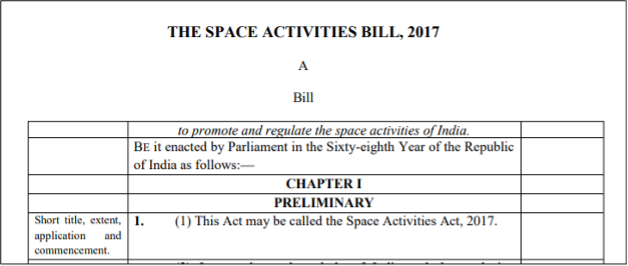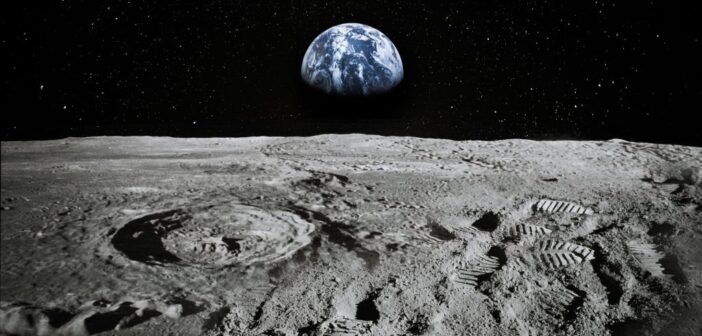Following the successful soft-landing of Chandrayaan-3 on the Moon, there have been numerous reports of people buying property on the Moon and other planets. But what is the legal basis for these? What do the treaties about the Outer space say?
Ownership of property outside Earth is a topic that has captured the imagination of many, especially in the current era which is marked by ambitious plans for space exploration and colonization by even private entities. On 23 August 2023, India created history by successfully soft-landing Chandraayan-3 on the Moon. This makes the Moon feel closer than before, and the enthusiasm for obtaining lunar real estate has seen a remarkable surge among Indians. Since the soft-landing, there have been many reports of people buying and gifting property on the Moon. However, this is not a recent development. From the former Presidents of the United States- George H.W. Bush, Jimmy Carter, and Ronald Reagan to Indian Bollywood Celebrities- Shah Rukh Khan and Sushant Singh Rajput are reported to own property on the Moon.
Not just the moon, there are even claims for other planets. For instance, in 1997 when NASA sent the Pathfinder spacecraft and Sojourner rover to Mars, three men from Yemen sued NASA for trespassing on their inherited property. They claimed that they had inherited the planet from their ancestors 3,000 years ago and that NASA landed on Mars and began exploring it without informing them or seeking their approval.
A simple Google search reveals that there are websites like the Lunar Embassy, Cosmic Register, or Lunar Registry that offer to sell property on the Moon, Mercury, Venus, Mars, and Pluto. An acre of land on these planets and the Moon costs $ 34.99 or Rs. 2,900. People are even given the option to choose the area on the celestial body where they wish to buy the plot. One of the websites even offers people the opportunity to purchase the entire Pluto for just $250,000 or over Rs. 2 crores, along with Mineral Rights. In return, the purchasers of the extra-terrestrial property would be given a “deed” with/without their name on it. There are many online articles/guides on how to purchase such extra-terrestrial property.
But what is the legal basis?
The United Nation’s Outer Space Treaty of 1967, also known as the ‘Treaty on Principles Governing the Activities of States in the Exploration and Use of Outer Space’, including the Moon and Other Celestial Bodies, is a crucial international agreement that establishes the foundational principles for activities in outer space. Article I of the Treaty describes outer space as the province of all mankind.

Article II of the Treaty explicitly states that outer space, including the Moon and other celestial bodies, cannot be claimed by any nation as sovereign territory. It prohibits the establishment of territorial sovereignty in space.

Further, the Treaty recognizes the freedom of all countries to explore and use outer space for the benefit of all humanity while encouraging international cooperation for the same. It recognizes the freedom of all countries to explore and use outer space for the benefit of all humanity and holds States responsible for ensuring that their space activities are consistent with the treaty’s provisions and addressing any damage caused by their space objects on Earth or in outer space. The Outer Space Treaty also emphasizes that outer space should be used for peaceful purposes.
A total of 114 nations, including India, the US, Russia, and the UK are parties to the Treaty and have ratified the same, which does not allow exclusive claim to celestial bodies.
The Moon Agreement also reiterates that the Moon and its natural resources cannot become a property of any State, organization or individual
The Moon Treaty or the Agreement Governing the Activities of States on the Moon and Other Celestial Bodies was entered into force in 1984. Unlike the Outer Space Treaty, which primarily addresses the broader principles of space activities, the Moon Agreement specifically deals with the use and exploitation of the Moon and other celestial bodies beyond Earth’s orbit. The agreement also explicitly mentions that the Moon and its natural resources are the common heritage of mankind and reiterates that the Moon and its natural resources cannot become a property of any State, international intergovernmental or non-governmental organization, national organization, or non-governmental entity or of any natural person.

Only India and 17 other countries are Parties to this agreement. However, other countries like the US, Russia, and China which have previously landed on the Moon are not part of this agreement.
The answer to the question of whether individuals or entities can own property outside Earth is that no one can own property on the Moon or in any celestial body as per the international agreements.
There is no regulation or restriction on resource extraction in Outer Space
While property ownership is not permitted by these agreements, utilization of the resources does not have any regulations. That is, the agreements have not prohibited or restricted the extraction of such resources.
The Artemis Accords of NASA is a non-binding set of principles designed to guide civil space exploration and use in the present when more countries are exploring Outer space. It was launched in 2020 and has 27 signatories, including India, as of June 2023. The Accords establish that the extraction of space resources does not inherently constitute national appropriation as per the Outer Space Treaty. It should be noted that the Accords are not international law.

India does not have a Space Law yet
Many countries including the US, China, Brazil, Japan, Russia, and Australia have their own National Space Laws. These legislations are to govern space activities conducted by that nation’s space agency, commercial companies, and individuals. They also deal with a wide range of issues such as satellite licensing, launch regulations, and space debris mitigation, among others.
While India still does not have such space legislation, a draft Space Activities Bill was published in 2017 recognising the need for it not only because of the interest shown by the private sector but also because space activities need participation from private sector agencies as well. The draft also talks about commercial space operations.

Irrespective of the Bill, the Government of India is encouraging non-government entities to participate in space-related activities and has created the Indian National Space Promotion and Authorisation Centre (IN-SPACe) under the Department of Space (DOS), to promote, handhold, and authorize activities of NGEs in the space sector.
India’s space sector has made significant advancements over the years, establishing itself as a prominent player in the global space community.
Interest in Parliament too
Here are some interesting questions related to the space, raised by the Members of the Parliament in the Lok Sabha and Rajya Sabha.
- Sisir Kumar Adhikari asked if an Indian spacecraft planning to brew beer on the moon to which the PMO replied that India doesn’t have such a plan.
- Rajkumar Dhoot asked if it is a fact that according to the UN Space Agency Aliens are likely to visit globe in the near future and apprehend that they may target nuclear capabilities on Earth. Minister of Parliamentary Affairs replied that ‘Though there are several independent views on presence of life beyond earth, there are no conclusive evidences and scientific proof on the same [As such there is no UN Space Agency].”



